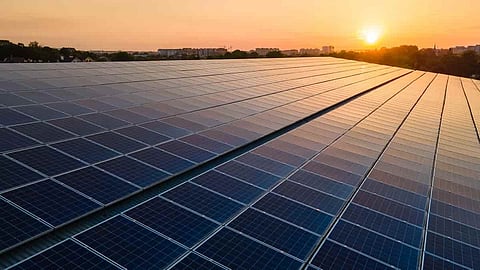

New Delhi: The Ministry of New and Renewable Energy (MNRE) announced on Tuesday that it will allow cancellation of renewable energy project Letters of Award (LoAs) that have minimal or no prospects of progressing to Power Sale Agreements (PSAs), but only after comprehensive case-by-case due diligence. The announcement addresses a critical bottleneck affecting 43,942 MW of capacity where PSAs with distribution companies or other end procurers remain unsigned.
Follow Energy Watch on X
According to MNRE's statement, "Following this review, only those LoAs with minimal or no prospects of PSA execution may be considered for cancellation on a case-to-case basis. Even then, such cancellations are expected to be phased and undertaken only after all feasible and viable options for executing the Power Sale Agreements (PSAs) and corresponding Power Purchase Agreement (PPAs) have been thoroughly explored."
The gap between awarded projects and executed contracts reveals a widening execution bottleneck. While REIAs have successfully signed PSAs for 24,928 MW of capacity since April 2023, the pipeline of unsigned PSA projects has grown substantially. The backlog now represents approximately 25 percent of India's total installed renewable capacity — a significant drag on achieving the government's 500 GW renewable capacity target by 2030.
Over the past four years, from 2020 to 2024, India canceled 38.3 GW of utility-scale renewable energy capacity — accounting for nearly 19 percent of all tendered capacity during that period, a report by Institute for Energy Economics and Financial Analysis (IEEFA) said.
The fundamental challenge preventing PSA execution stems from DISCOMs' reluctance to commit to long-term power purchases when project commissioning dates remain uncertain. Some distribution companies have expressed concerns about signing PSAs for bids where the "likely start date of connectivity for the successful bidders is in distant future," according to MNRE's Tuesday statement.
This reflects a structural mismatch in the renewable energy procurement timeline. According to a statement made by the Ministry of Power in Parliament in July 2025, of 230 GW of renewable energy projects planned to connect through interstate transmission lines, only 20 percent of required transmission infrastructure is ready, 70 percent remains under construction, and the remainder is in bidding or planning stages with no firm timeline. The transmission lag creates uncertainty about when projects can actually deliver power, making DISCOMs unwilling to sign binding procurement agreements.
A parallel challenge driving PSA delays is shifting market preferences. DISCOMs and commercial consumers increasingly prefer solar-plus-storage and firm dispatchable renewable energy (FDRE) solutions over plain solar power, driven by declining costs for integrated systems and the ability to supply power during peak demand hours. This has reduced demand for traditional solar tenders, with some projects awarded at lower tariffs now facing reluctant offtakers.
MNRE acknowledged this shift on Tuesday, stating it is "sensitizing the REIAs to move from plain solar tenders to tenders of Solar + Energy Storage, tenders with configuration to supply renewable power during peak hours and tenders with configuration to supply firm and dispatchable renewable energy (FDRE)."
To create urgency, the government has amended standard bidding guidelines for solar, wind, hybrid, and FDRE projects to allow cancellation of LoAs if PSAs are not signed within 12 months from the date of issuance. However, MNRE's Tuesday statement makes clear this is not an automatic trigger — REIAs must first conduct due diligence and categorise cases based on multiple factors including "the configuration of renewable energy envisaged to be supplied under the bid, the discovered tariff for supply of renewable power and the expected timeline for connectivity."
To unlock the stranded capacity, MNRE has committed a Rs 2.4 lakh crore investment plan for transmission infrastructure associated with 500 GW of renewable energy. Recent amendments to General Network Access (GNA) regulations aim to unlock stranded capacity and enable dynamic corridor sharing to ease grid congestion and improve access in renewable-rich states like Rajasthan and Gujarat.
The government is also urging states to comply with Renewable Consumption Obligations (RCOs) under the Energy Conservation Act and is conducting regional workshops with major renewable-procuring states to address implementation challenges and accelerate PSA signing, said the MNRE.
Despite the PSA backlog, India's renewable energy capacity additions remain robust. The country added approximately 29 GW of renewable capacity in FY 2024-25 (excluding large hydro) and has already added around 25 GW in the first half of FY 2025-26. India's total installed renewable capacity reached 197 GW (excluding large hydro) as of 2025, with over 186 GW of capacity under implementation and an additional 67 GW already tendered.
As of June 30, 2025, India had already achieved its 2030 target of sourcing 50 percent of installed electricity capacity from non-fossil fuel sources, with 242.78 GW of non-fossil installed capacity representing 50.08 percent of the nation's total 484.82 GW capacity mix.
Follow Energy Watch on LinkedIN
Addressing investor concerns about asset stranding, MNRE stated on that "the apprehensions regarding massive investments in renewable power may get into limbo, on account of cancellation of LoAs which cannot secure PSA/PPA, is unfounded, since major investment in any renewable power project starts only after the execution of Power Purchase Agreement and the investments, if any made by any RE power developer in land or connectivity, are used by the RE power developers for other existing projects or future projects in their portfolio."
